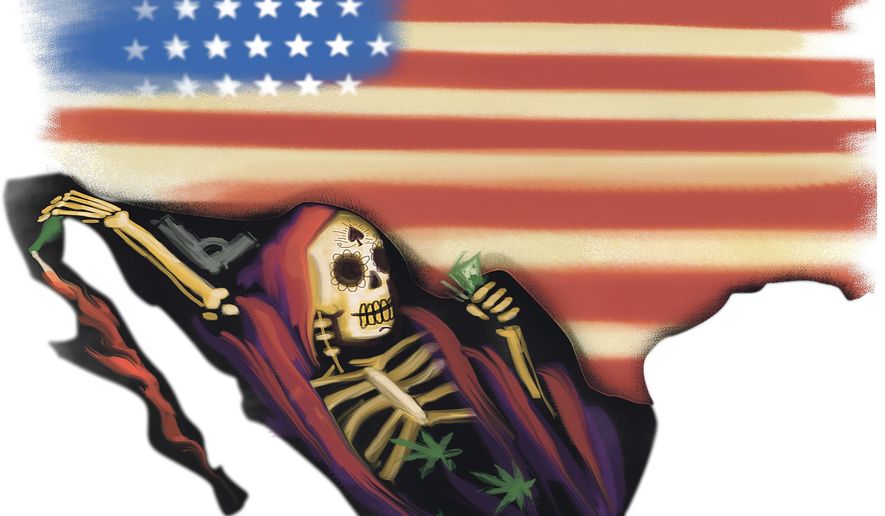OPINION:
If it wasn’t clear before, after last week’s tepid meeting of the North American Leaders Summit between the leaders of the U.S., Mexico and Canada, colloquially known as the “Three Amigos” summit, the counterdrug relationship between the U.S. and Mexico is on ice.
While some U.S. officials and drug watchers had hoped for a breakthrough in counterdrug cooperation following the arrest of Sinaloa Cartel leader Ovidio Guzman just days before the summit, there appears to have been little progress bridging the ever-widening gap between the U.S. and Mexico. In the official readout from the summit, the countries made vague promises to “coordinate actions and strategies to combat arms and drug trafficking, as well as trafficking in persons” — which amounts to a big nothing burger.
At the start of the summit, in a sign of things to come, Mexican President Andres Manuel Lopez Obrador criticized the U.S. for its “abandonment … disdain … and … forgetfulness for Latin America and the Caribbean,” citing a lack of investment in the region for more than half a century. President Biden pushed back, noting that the “United States provides more foreign aid than every other country … in the world” and does not have the luxury of having only one focus. Still, Mr. Lopez Obrador has a point.
The U.S. has long neglected its “near abroad,” expending far more time, money and energy in recent years on other far-flung regions, despite the growing threats next door. That lack of attention has set the conditions for the current lack of cooperation.
The Biden administration should remain open to improved relations with the Mexican government. Still, in light of Mr. Lopez Obrador’s most recent recalcitrance, it is time for the U.S. to acknowledge that it must work around Mexico to combat the drug trade. Only we can get ourselves out of this mess.
What steps can the U.S. take independent of Mexico to help tackle the ongoing drug crisis? Some have suggested that designating Mexican cartels foreign terrorist organizations and labeling synthetic drugs such as fentanyl and methamphetamine as weapons of mass destruction would provide U.S. government agencies more tools to attack the cartels. These moves, however, would be mostly symbolic — the U.S. already has broad authority to issue sanctions, freeze assets, and bar entry into the country under the Foreign Narcotics Kingpin Designation Act — and could further complicate anti-drug efforts.
For example, how would the U.S. determine who qualifies as a terrorist under these new provisions? Would violent street gangs working in cahoots with Mexican cartels be subject to new federal terrorism laws? Would every drug trafficking case suddenly become a terrorism case? These are just a few of the thorny issues that would emerge from such a designation.
The truth is that U.S. law enforcement already has powerful laws on the books that enable them to aggressively pursue drug trafficking organizations operating around the world. What it really needs is more resources and strategic guidance.
U.S. law enforcement agencies, like the military, have struggled to recruit and retain adequate staff. While funding for drug control has increased modestly in recent years, it is insufficient to meet today’s unprecedented challenges. And while law enforcement knows the threat better than anyone, it has been slow to adapt to the explosion of cheap and potent synthetic drugs like fentanyl. With over 108,000 Americans dying from drug overdoses in the last 12 months alone, there is no time to lose.
The U.S. drug crisis requires “all hands on deck.” While law enforcement agencies like the Drug Enforcement Administration and Customs and Border Protection are primarily responsible for reducing the drug supply, every agency across the federal government should be racing to contribute solutions. Just as the U.S. military has pivoted to China, declaring it the “pacing challenge” to U.S. national security, U.S. law enforcement and supporting agencies must urgently pivot their resources to Mexico (recognizing that China also plays a critical role in the U.S. drug crisis).
The U.S. must exercise all its authorities to bring the Mexican cartels to heel, for example, by significantly increasing the number of kingpin designations and sanctions against cartel members, surging law enforcement personnel to the border and other drug trafficking hubs across the U.S., fielding innovative technologies to stop drugs from entering the U.S. through the southwestern border and other points of entry, and improving information sharing and collaboration across all levels of government to strengthen the domestic response to drug trafficking.
As the summit came to a close, Mr. Biden tried to strike a positive tone, noting that “in today’s interconnected world … we cannot wall ourselves off from shared problems.” Drug trafficking certainly qualifies. But absent a shared commitment from Mexico to take meaningful action against the drug cartels, the U.S. may have no choice but to go it alone.
• Jim Crotty is the former deputy chief of staff at the Drug Enforcement Administration.




Please read our comment policy before commenting.